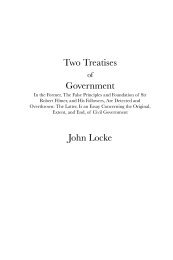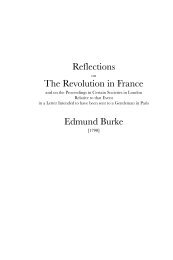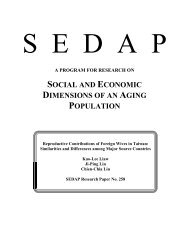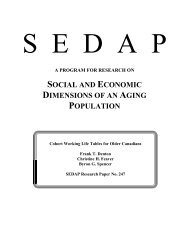Das Geheimnis des Opfers oder Der Mensch ist, was er iÃt The ...
Das Geheimnis des Opfers oder Der Mensch ist, was er iÃt The ...
Das Geheimnis des Opfers oder Der Mensch ist, was er iÃt The ...
Create successful ePaper yourself
Turn your PDF publications into a flip-book with our unique Google optimized e-Paper software.
the Semites. Most commonly, ref<strong>er</strong>ence is made to Smith’s core concept of sacrifice as an<br />
age-old liminal exp<strong>er</strong>ience of communion between the human and divine worlds.<br />
Around the same time, Sigmund Freud (1960), in the fourth essay of Totem and<br />
Taboo, made Smith’s view of sacrifice (which establishes kinship among a people and its<br />
gods through a process of oral incorporation of the same substance), into the lynchpin of<br />
his argument conc<strong>er</strong>ning the phylogenetic origins of the Oedipus complex.<br />
More recently, Gordon Booth (2002, 255) reit<strong>er</strong>ated the h<strong>ist</strong>orical importance of<br />
Smith’s views on sacrifice more gen<strong>er</strong>ally.<br />
And most recently, Rob<strong>er</strong>t Allun Jones (2005, 59–103) und<strong>er</strong>scored Smith’s<br />
importance in his own study of the totemism debate in late nineteenth, early twentieth<br />
century anthropology. 1<br />
In 1862, Ludwig Feu<strong>er</strong>bach wrote an essay entitled: <strong>Das</strong> <strong>Geheimnis</strong> <strong>des</strong> <strong>Opf<strong>er</strong>s</strong><br />
<strong>od<strong>er</strong></strong> d<strong>er</strong> <strong>Mensch</strong> <strong>ist</strong> <strong>was</strong> <strong>er</strong> isst [<strong>The</strong> Myst<strong>er</strong>y of Sacrifice or Man is What he Eats]. <strong>The</strong><br />
essay <strong>was</strong> published in the first edition of Feu<strong>er</strong>bach’s collected works in 1866 but it <strong>was</strong><br />
not to become one of his more famous or celebrated pieces. In fact, Friedrich Jodl, who<br />
along with Wilhelm Bolin, edited a lat<strong>er</strong> edition of Feu<strong>er</strong>bach’s collected works<br />
(1903–1911), felt called upon in his introduction to Volume X (which contained the<br />
essay in question) to defend the seeming one-sidedness of Feu<strong>er</strong>bach’s writing. Jodl<br />
<strong>des</strong>cribed the essay as containing “num<strong>er</strong>ous crudities” <strong>des</strong>cribing the “almost suicidal<br />
zeal” of Feu<strong>er</strong>bach’s one-sided argumentation against speculative philosophy. Jodl<br />
[Feu<strong>er</strong>bach: (1862) 1960, VII–VIII] then went on to justify this one-sidedness as a kind<br />
of necessary strategy that Feu<strong>er</strong>bach <strong>was</strong> forced to adopt. Feu<strong>er</strong>bach (1866: X, 41)<br />
himself made no such apologies to G<strong>er</strong>man philosophy, as we can see in the opening<br />
paragraph of his essay below.<br />
<strong>The</strong> essay is of scholarly int<strong>er</strong>est and hence worthy of translation into English (for<br />
the first time h<strong>er</strong>e) for a numb<strong>er</strong> of reasons. First, it contains most of the core theoretical<br />
points made by Smith and taken up by Durkheim, Freud, many of their contemporaries,<br />
and students of sacrifice down to the present. Even those Feu<strong>er</strong>bach commentators such<br />
1. Jones (op. cit., 308) suggests that Henry Sumn<strong>er</strong> Maine adumbrated the theory of sacrifice as establishing kinship in<br />
his 1861 inaugural book: Ancient Law. Th<strong>er</strong>e are two problems with this suggestion. <strong>The</strong> first conc<strong>er</strong>ns the ref<strong>er</strong>ence<br />
only to sacrifice establishing kinship, wh<strong>er</strong>eas Smith’s theories on sacrifice included num<strong>er</strong>ous oth<strong>er</strong> aspects. Second,<br />
this element of the theory <strong>was</strong> known to classical antiquity, which will be clear in the translation that follows. Maine<br />
himself pointed out that ‘nothing moves und<strong>er</strong> the sun which is not Greek in origin.’








